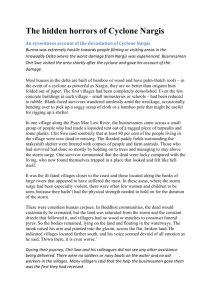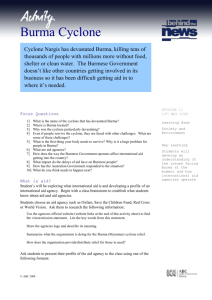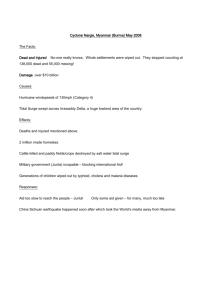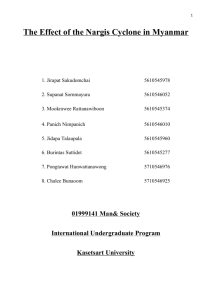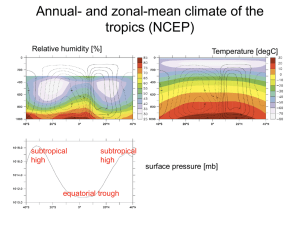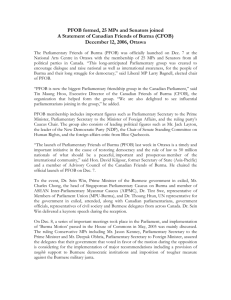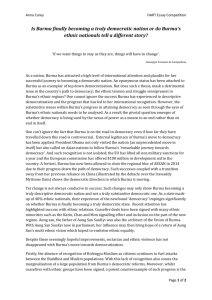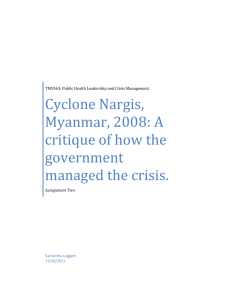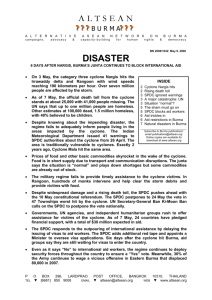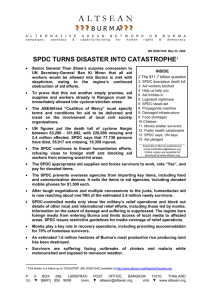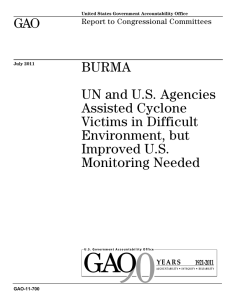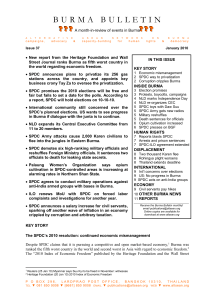presentation - GeographyPods
advertisement
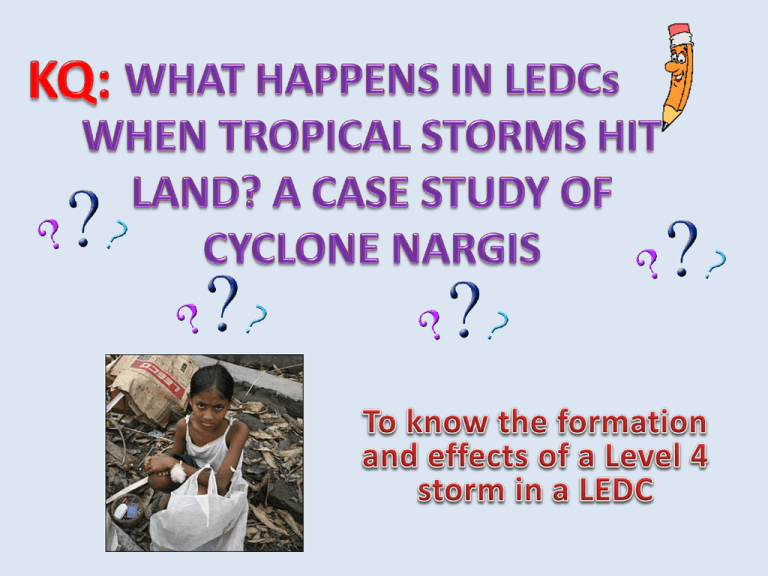
Burma is a LEDC with a population of 55 million and is one of the poorest countries in southeast Asia; development is restricted due to issues with the ruling military and a desire to be isolated from the rest of the world. A GDP comparison with the USA: USA Burma (Myanmar) $45,989 $2,697 Describe Burma’s location and stick your sheet in Introduction to Myanmar Burma ranks 32nd in a list of the world’s 50 poorest countries and the last thing it needed was a disaster the size of Nargis. Describe the relief of Burma. How might this have an effect on the amount of devastation caused by Cyclone Nargis? Another physical factor has been the destruction of 83% of the mangroves in the Irrawaddy Delta. Mangrove swamps get converted into money-making areas such as shrimp farms and land for agriculture. Mangroves act as a natural sea defence to stop storm surges – their roots catch material and absorb wave energy. Formed 27th April 2008 in the Bay of Bengal Hit the Irrawaddy Delta, Burma – at midday on 2nd May 2008 Downgraded from a cyclone – 3rd May 2008 Category 4 storm (wind speeds to 220 kph); 60 Kph less than Katrina... - 2nd deadliest cyclone of all time (after Cyclone Nina in 1975) - 125,000 people died - The cyclone was initially meant to hit Bangladesh but it changed its track and headed eastwards in the Bay of Bengal, hitting Burma instead - Cyclone Nargis caused $10 billion in damage to southern Burma - Relief efforts were slowed as Burma’s military government rejected large scale international aid PLAY WATCH THE CLIPS OF CYCLONE NARGIS AND MAKE NOTES ON: - THE EFFECTS PLAY READ THROUGH ‘THE HIDDEN HORRORS OF CYCLONE NARGIS’. IDENTIFY FURTHER EFFECTS AND ADD THESE TO THE LIST FROM THE VIDEOS Destruction of thousands of homes Many trees lay across roads, disrupting traffic and aid supplies Hundreds of thousands of people made homeless with no access to clean water Many who lost their homes – including young children – desperate to find shelter People had to queue to buy clean water at heavily inflated prices Warning. Graphic Content. A family lies dead in Bogolay, in one of the regions worst hit by the cyclone. A dead body is seen floating in floodwaters southwest of Yangon. 95% of buildings in the Irrawaddy Delta destroyed Sewage contaminated rice fields and caused disease Dirty water encouraged mosquitoes to breed, increasing risk of malaria Electricity lines were destroyed and roads swept away Flooding caused short-term effects of homelessness and death Long-term effects included villages and livelihoods destroyed The entire coastal plain is flooded in the May 5 image (bottom). The agricultural areas appear to have been especially hard hit. For example, Yangon (population over 4 million) is almost completely surrounded by floods. Explain why so many people chose to live in such a potentially dangerous area as the Irrawaddy Delta. READ THROUGH ‘The death and destruction of Nargis was largely hidden from world view’ AND THEN: - EXPLAIN THE RELIEF/RESPONSE EFFORT - GIVE SPECIFIC EXAMPLES OF DIFFICULTIES IN SUPPLYING AID TO BURMA Aid was being kept in cities and not reaching rural areas Experts suggested resistance to aid was an attempt to preserve national pride A week after the cyclone hit, only 1 in 10 of those affected had received some sort of aid Leaflets distributed to inform people that aid deliveries only attracting children and those who do not need help Foreign aid workers were not allowed into Burma or were restricted in their travels The Burmese army harassed volunteers 4 Brutal facts about Nargis 3 Social Effects 2 Economic Effects 1 Reason why the Irrawaddy Delta was so badly affected
